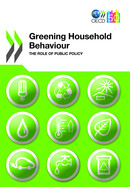Croissance verte et développement durable
Green growth and consumer behaviour
|
Consumers account for more than 60% of final consumption in the OECD area, and can have a major impact on green growth by purchasing products that have desirable environmental properties such as recyclability and energy efficiency, and by modifying their behaviour to support environmental goals. Their motivation to do this depends on: |
|
- The financial costs and benefits of making “greener” choices, and the infrastructure that can be put in place to support these choices.
- Access to high-quality, reliable information about the environmental characteristics of products, which helps consumers express their demand for environmental quality in the marketplace.
- How much consumers know about environmental issues, the environmental impact of their consumption and lifestyle decisions, and the practical actions that they can take to support sustainability goals.
- The level of commitment to supporting green objectives.
- What impact behavioural biases have on the decisions and actions taken by consumers and households.
Industry, governments and civil society can all contribute to an environment in which consumers have the information and tools needed to make greener purchasing choices, and households are encouraged to take actions that support environmental goals.
Current OECD work
The project on Household Behaviour and Environmental Policy aims to enhance understanding of what affects people’s attitudes and decisions and households’ responses to environmental policies to provide guidance to policy-makers in five key public policy areas: residential energy and water use, transport choices, organic food consumption, and waste generation and recycling.
Pricing the use of environmental resources has proven to be a powerful tool for influencing consumer and household decisions. For example, the results of the first OECD Household Survey presented in a recent publication, Greening Household Behaviour: The Role of Public Policy, indicate that households charged for water consume approximately 20% less water than those who are not. In addition, households which are subject to unit pricing are more likely to install water-efficient and energy-efficient equipment at home. Similarly, fuel costs decrease car use and waste charges increase recycling volumes and encourage waste prevention.
While economic instruments are powerful tools, “softer” instruments need to be given close attention in developing more comprehensive strategies to influence consumer and household behaviour. Access to comprehensible and trustworthy information can strengthen markets for environmentally friendly products, particularly for goods and services where environmental attributes are less ‘visible’. The way in which information is presented and the way that choices are framed can influence consumer decisions. For example, eco-labels can be more effective if the environmental benefits are accompanied by more direct personal benefits for the consumer, such as a reduced energy bills resulting from energy-saving behaviour.
Implementing the following types of policies could promote more environmentally-friendly consumer and household behaviour:
- Providing the right economic incentives through introducing effective economic instruments and tailoring policies to suit markets.
- Enhancing the quality and reliability of information available to consumers. This involves ensuring the quality of claims made by firms by promoting the development of guides, standards and codes, by endorsing labelling requirements, and by developing and implementing enforcement strategies. Supporting trustmarks and third party certification, as well as supporting the development of comparison tools can also improve consumer information.
- Strengthening knowledge and awareness by promoting education and raising awareness.
- Increasing the level of commitment and addressing behavioural biases by increasing the focus on long-run impacts of policies, framing information in more environmentally compelling ways and designing policies in ways that support environmentally responsible behaviour.
The 2011 round of the OECD Household Survey will identify changes in people’s attitudes and behaviour towards the environment, and examine ways to promote green growth and the development of a low-carbon economy.
The Consumer Policy Toolkit examines how markets have evolved and provides insights for improved consumer policy making. It explores how behavioural economics can be used to improve understanding of consumer decisions, by looking at methods for analysing consumer market problems and what policy instruments have been useful in helping consumers make good decisions.
Further reading
|
Household Consumption: www.oecd.org/environment/households
Household and Public Sector Consumption and the Environment: www.oecd.org/env/cpe/consumption
|
|
Documents connexes

